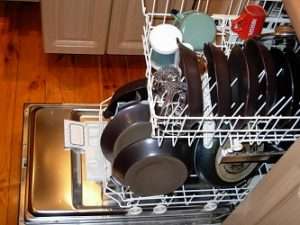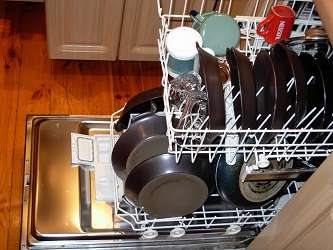Dishwashers are now quite common in multiple homes across the globe, but one of the most frequent questions that people ask is, “Are dishwashers hardwired”. You must be wondering the same thing, aren’t you? Don’t worry; we’ve got your back! The answer to this question is a little dependable.
Many of you may think that all dishwashers are hardwired, and some have never considered a hardwired dishwasher. The truth is that dishwashers can be hardwired, but not all of them. Location plays an important role in realizing whether your dishwasher can be hardwired or not. If you are living in a place with low electric output, it is more likely that your dishwasher is hardwired.
Let’s dig in a little more! Have a look!
How do you know that the dishwasher is hardwired?
The dishwasher can or cannot be hardwired; it all depends on the electrical system, appliance’s power requirements, budget, lifestyle, and kitchen setup of your home. If you haven’t seen a hardwired dishwasher, it might be a little difficult to know if it is a plug-in or a hardwired one. Well, there are a few things you should observe and recognize what kind of power supply your dishwasher has. Have a close look at the cables and all the connections of the dishwasher.
If the wires are permanently connected to the unit and cannot be separated, the dishwasher is hard-wired. However, the plug-in dishwasher has wires that seem separable without technical equipment. In simple words, if you don’t see any plugs or codes with your dishwasher, it will directly connect with the main power supply and is hardwired.
Is it possible to convert hardwired dishwashers into plug-ins?
If you have a plug-in dishwasher at your home and want to convert it into a hard-wired one, it’s not very challenging. You should first remember that you are trying the procedure on an approved outlet to avoid any mishap. Then, all you have to do is remove the cable and use a plug instead of in the electrical outlet box. Still confused? Follow these easy steps to convert a plug-in dishwasher into a hardwired one.
- Open the screws to fix the dishwasher, but ensure you have turned off the power supply before.
- Also, remove the water supply and make sure no cords are still connected to the dishwasher. However, if you are comfortable working around the wires, make sure you don’t make any contact with them.
- Cut the bare copper ground wire using pliers in the junction box.
- Now grab the wires and peel off the thick insulating material around ½ inch from it.
- Now, again cover the wires using nuts after twisting their ends and connecting to the matching cords.
- Connect the green and copper wires to the power plug and secure all the connections by using electrical tape and wrapping all the wires.
How to hardwire a dishwasher?
If you don’t want to take help from a professional electrician, you can also hardwire a dishwasher at your home. It’s a little bit tricky, but if you follow the steps as it is, it seems quite easy. Following are the tools that you should have before starting the procedure
Optional:
- Steel enforced ducting
- Electrical boxes
- PVC pipe
Necessary:
- Circuit Breakers or fuses
- Wire nuts or connectors
- Electrical tape
- Clamps
- Wrenches
- Screwdrivers
Steps to follow:
- Look closely at the breaker panel and find the breaker of the electrical circuit of the dishwasher. Now turn off that breaker to avoid any electrical damage. Also, you will be safe from experiencing any current while dealing with the wires.
- Now, where you will install the dishwasher, drill a hole of around 3 by 4 inches. The hole should be on the right side of the wall. If the drill hole isn’t smooth, use grit sandpaper to smoothen it.
- Now take the dishwasher wire, and connect it to the junction box by passing it through the drilled hole.
- There is a box known as a terminal box at the back of the dishwasher that includes all the connections. The cover of that box secures the wires from water or other substances that can damage them.
- Now remove all the screws of the outlet faceplate to detach it from the wall.
- Take a screwdriver and detach the receptacle. Remove the can and wires by unscrewing the nuts. In the end, you will see a box with many wires on the wall.
- Create a dishwasher circuit, and if it is already there, then there’s no need for this step.
- Now make an electric line through the wall at the back of the dishwasher in the circuit box.
- Connect a stud to the junction box by making a hole in the wall.
- Now take the dishwasher’s electrical wire and connect it to this box.
- There is a grommet at the bottom of this box. The dishwasher’s wires and the wall pass to this location before they are attached to the terminal box to make a hard-wired dishwasher.
- Take the wires and remove the insulation cover up to one inch using wire strippers. Use a wire cover to insulate these negative and positive ground wires, and splice them respectively to where they belong. If you feel any confusion in this step, you should need to consult a professional.
- Now put the dishwasher into the cabinet and fix the screws to secure the leader of the junction box.
Can every dishwasher be hardwired?
No, all the dishwashers cannot be hardwired; it depends on the model and the brand of the dishwasher. If you buy a dishwasher with a three-prong plug and an electrical cord, it is not a hard-wired dishwasher. If you are not sure about the place where you are going to fix the dishwasher, then do not opt for a hardware dishwasher. You can check all the information about the type of dishwasher in its manual.
Is it good to hardwire a dishwasher?
Hardwiring a dishwasher may help you in many things, but it will only be beneficial if you install and use it properly. If you are planning to replace your dishwasher and buy a new one, you might think about which connection should be the best in this case. You should opt for a hardware dishwasher or use the typical plug-in one.
Well, one thing that you should keep in mind is that, in any case of failure, it takes a few seconds to disconnect the dishwasher from the plug, but if you have a hardware dishwasher, it might take longer to reach the breaker box and disconnect the power supply. During this time, many things that are not good for safety purposes can happen.
Pros of the hardwired dishwasher:
Hardware dishwashers come with plenty of benefits, offering you the ease of use and Sophistication; let us look at some of the top benefits of hardware dishwashers.
- Hardware dishwashers are the best choice if you want to fix a dishwasher in your kitchen for a longer time.
- Hardware dishwashers manage all the electrical load easily.
- They are highly durable.
- Your kitchen looks more organized and clean as it doesn’t include lots of messy wires roaming in the kitchen.
- The hardware dishwasher has a more sophisticated design; ask to compare the two others.
- Hardwire dishwashers have a little stronger cleaning power.
Cons of the hardwired dishwasher:
Everything has its pros and cons. Now, as we have discussed some of the advantages of hardware dishwashers, it’s time to look at the possible drawbacks of the appliance.
- Hardware dishwashers are a bit expensive compared to normal ones.
- Unlike others, it takes a lot of time and complicated techniques to install a hardware dishwasher. You may need professional help in this case.
- If you are installing the hardware dishwasher on your own and there is a wiring mistake, fire hazards are higher.
- Sometimes more energy may be consumed than the actual requirement of the dishwasher.
- They can add up a little into your electricity bills
- Moving the dishwasher to any other place is hard because it’s connected directly to the power supply.
Conclusion:
In conclusion, the answer to the question, “are dishwashers hardwired” is that most dishwashers are hardwired nowadays, allowing the appliance to use a high amount of power. So it is never recommended to use this method on other appliances to save power. Moreover, if you have a plug-in dishwasher T your home, you can convert it into a hard-wired one for a better experience. But be wise and do not opt off a hardware dishwasher if it doesn’t match your requirements. For example, don’t waste time and money on having a hardwire dishwasher if you have a small kitchen.

